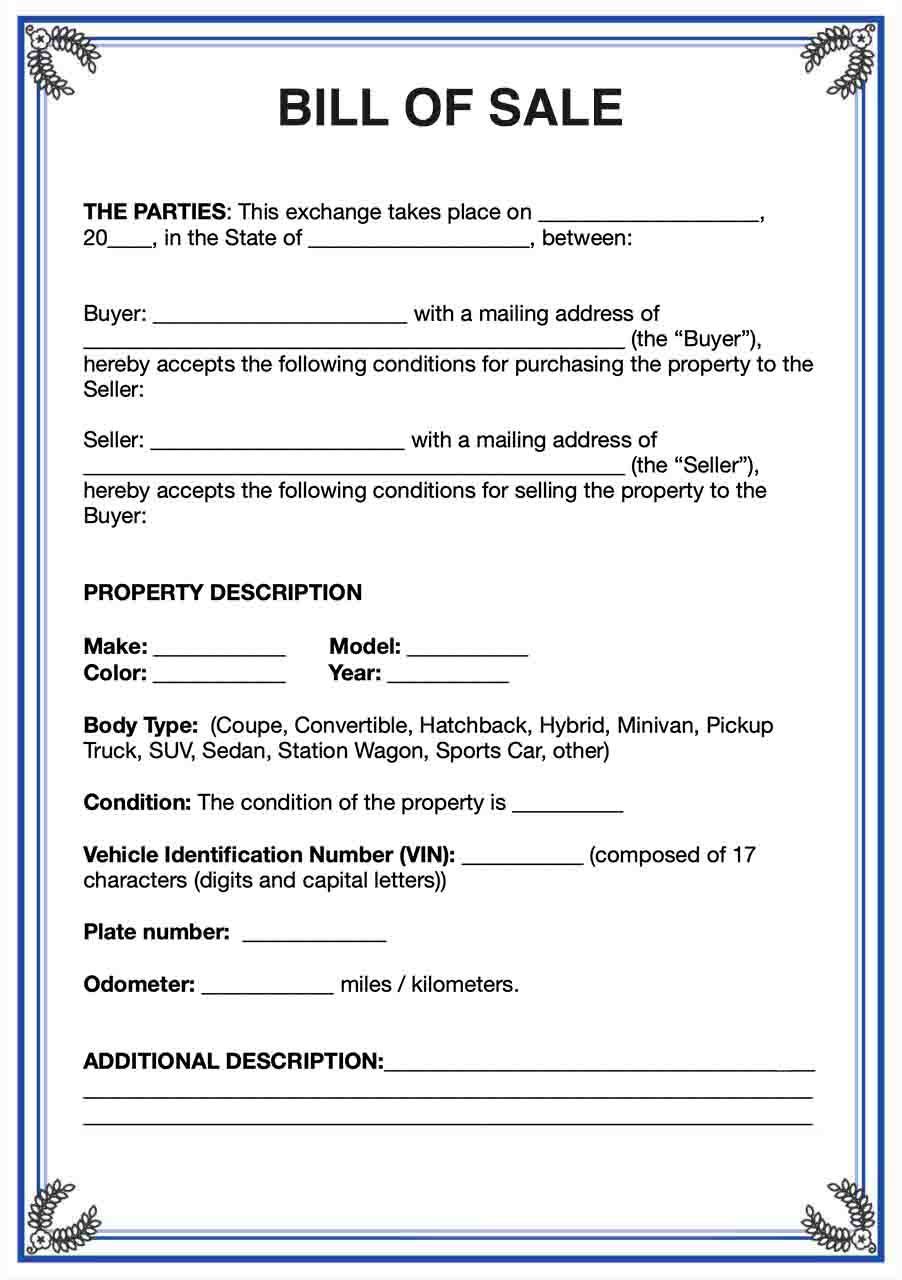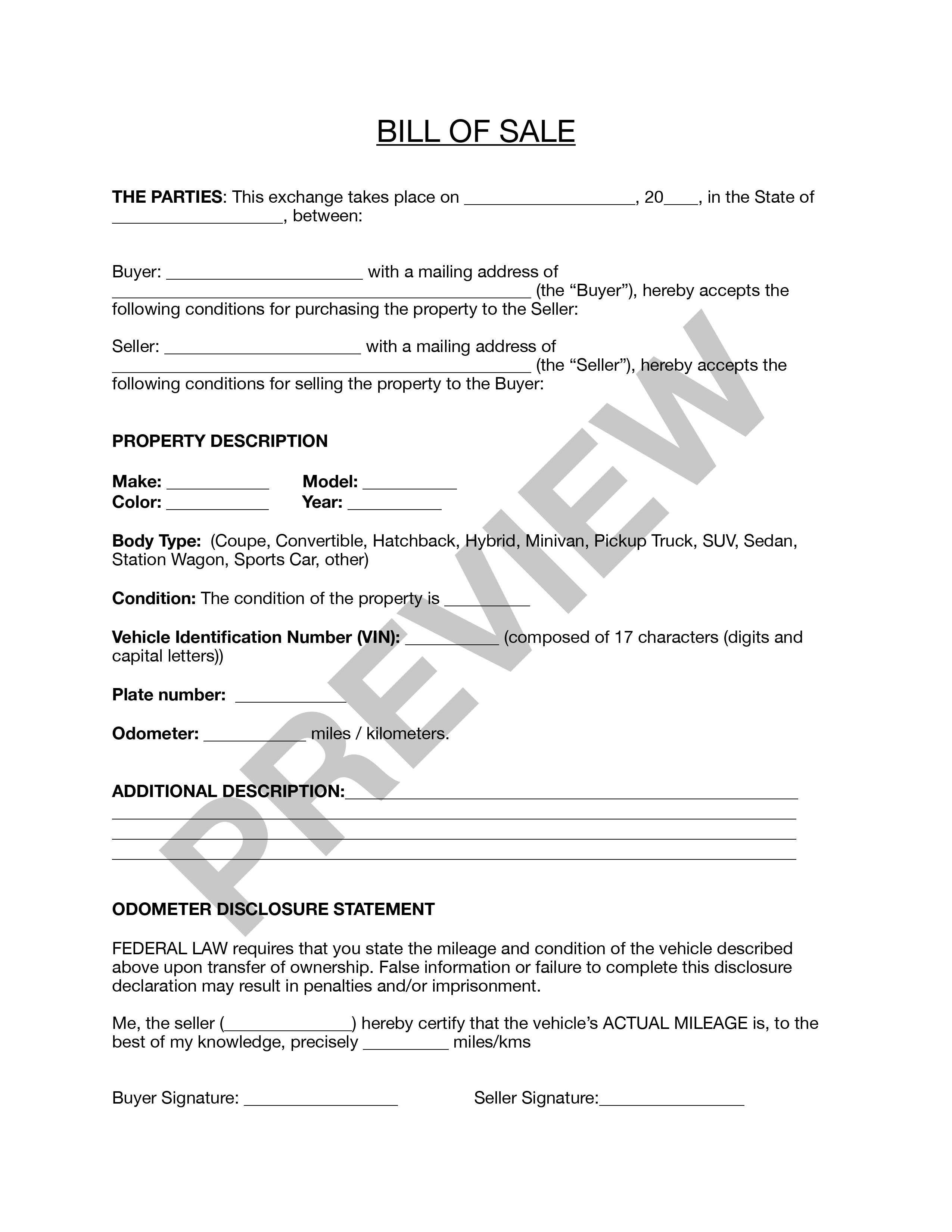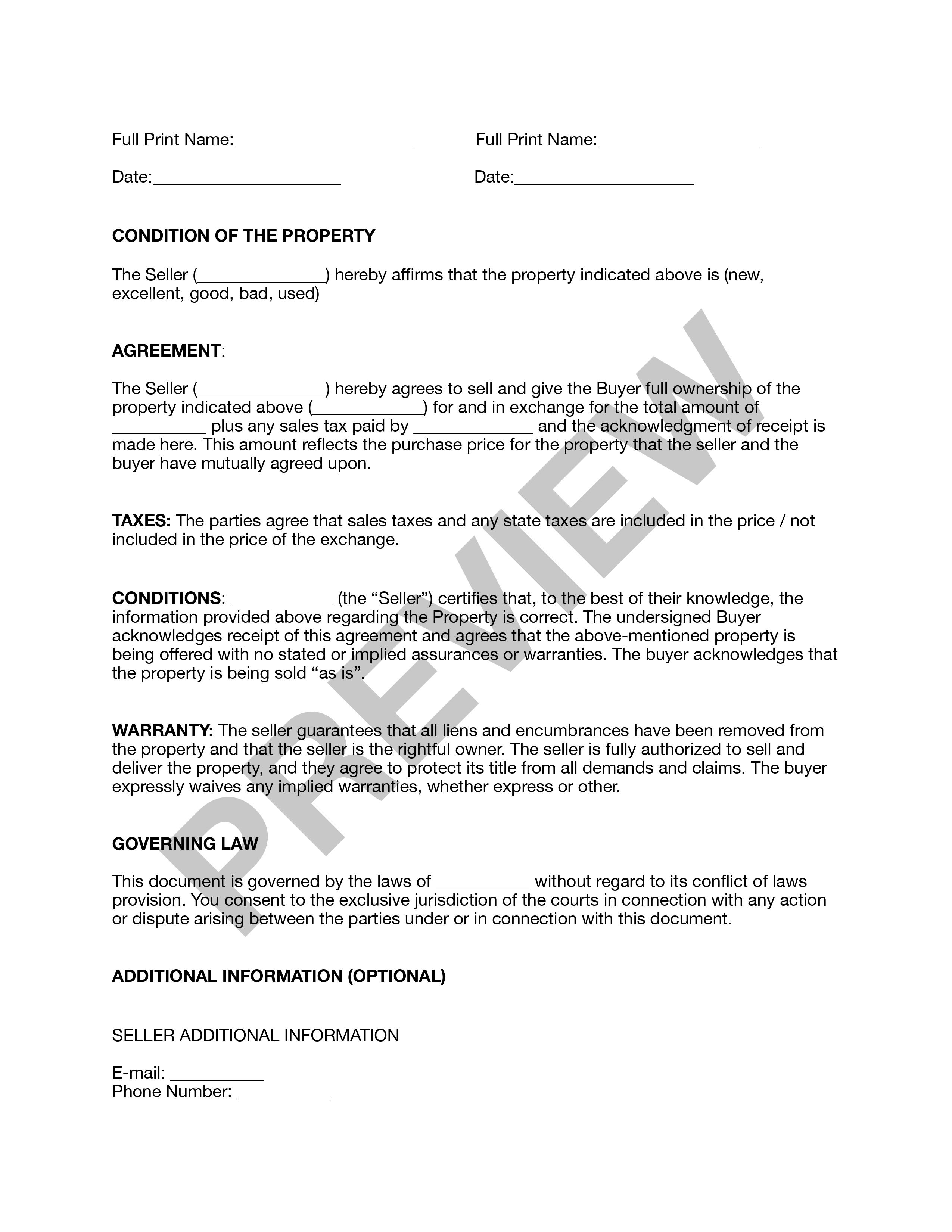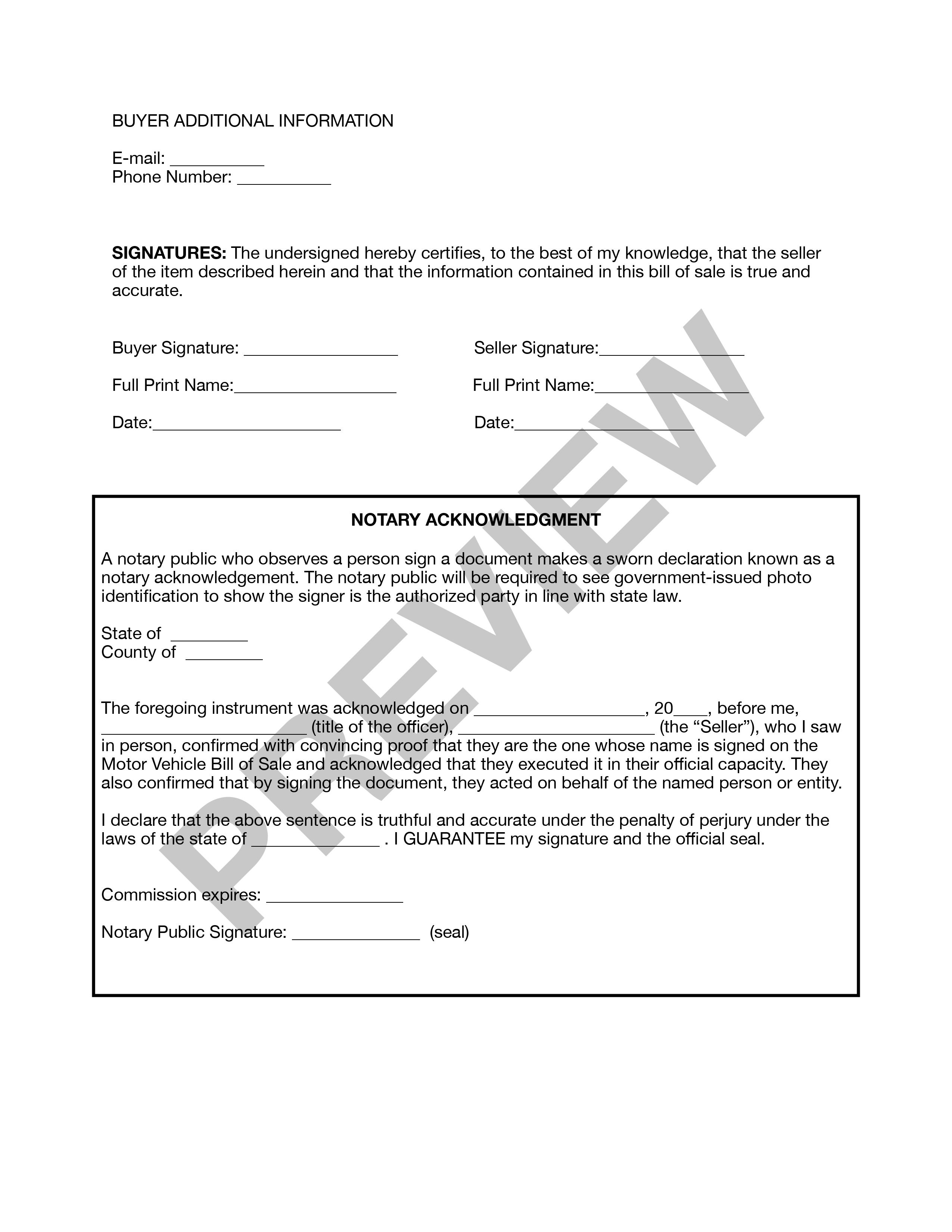Last Updated February 2023
What is a Bill of Sale?
A bill of sale is a legal document that serves as a record of a transaction between a buyer and a seller. It typically includes information about the buyer and seller, a description of the item being sold, the sale price, and the date of the transaction. Bills of sale are often used for the sale of personal property such as vehicles, boats, or livestock, but can also be used for the sale of other goods or services. They can provide proof of ownership and may be required for registration or other legal purposes.
Types of Bill of Sale
There are different types of bills of sale that can be used for various types of transactions. Some common types of bills of sale include:
-
Vehicle Bill of Sale: A document that records the sale of a motor vehicle between a buyer and seller. It includes details such as the make, model, year, VIN number, and sale price of the vehicle.
-
Boat Bill of Sale: A document that records the sale of a watercraft between a buyer and seller. It includes details such as the make, model, year, hull identification number, and sale price of the boat.
-
Firearm Bill of Sale: A document that records the sale of a firearm between a buyer and seller. It includes details such as the make, model, serial number, and sale price of the firearm.
-
Horse Bill of Sale: A document used to transfer ownership of a horse from the seller to the buyer, including details such as breed, age, and health condition, and signatures from both parties.
-
Motorcycle Bill of Sale: A document used to transfer ownership of a motorcycle from the seller to the buyer, including details of the sale and signatures from both parties.
-
Personal Property Bill of Sale: A document used to transfer ownership of personal property, such as furniture or electronics, from the seller to the buyer, including details of the sale and signatures from both parties.
-
Trailer Bill of Sale: A document used to transfer ownership of a trailer from the seller to the buyer, including details of the sale and signatures from both parties.
The specific details and requirements of a bill of sale may vary depending on the state or country in which the transaction occurs, so it's important to check local laws and regulations when preparing a bill of sale.
Who needs a Bill of Sale?
A bill of sale may be needed by both the buyer and the seller in a variety of circumstances. Here are some common situations in which a bill of sale may be necessary:
-
For legal or financial purposes: A bill of sale can provide proof of ownership and can be used as evidence in legal or financial disputes. It may be required for registration or transfer of ownership, especially for high-value items such as vehicles, boats, or firearms.
-
For tax purposes: A bill of sale can be used as a record of a transaction for tax purposes, such as reporting the sale of a business or claiming a deduction for the sale of personal property.
-
For warranty or liability purposes: A bill of sale can help to establish the condition of an item at the time of the sale, which can be important for warranty or liability claims.
-
For personal record keeping: A bill of sale can be a useful document to keep for personal record keeping, especially for valuable items or items with sentimental value.
The need for a bill of sale can depend on the specific laws and regulations of the state or country in which the transaction occurs, as well as the nature and value of the item being sold. It's always a good idea to check local laws and regulations and to consult with legal or financial professionals if there is any uncertainty.
What should I include in my Bill of Sale?
Here are some key elements that you should include in your Bill of Sale:
-
Date of sale: The date on which the transaction took place.
-
Parties involved: The names, addresses, and contact information of both the buyer and seller.
-
Description of the item: A detailed description of the item being sold, including any distinguishing features, serial numbers, or other relevant information that may be necessary to identify the item.
-
Purchase price: The amount of money being paid by the buyer to the seller for the item.
-
Payment terms: The payment method used (e.g. cash, check, bank transfer) and any other payment terms agreed upon by the parties.
-
Warranty or guarantees: Any warranties or guarantees made by the seller, including any limitations or exclusions.
-
Signatures: The bill of sale should be signed and dated by both the buyer and seller.
It's important to note that some jurisdictions may require additional information to be included in a bill of sale. It's always a good idea to research the specific requirements in your area to ensure that your bill of sale is legally valid.
Frequently Asked Questions
An as-is bill of sale form is a legal document used to transfer ownership of a product or property from the seller to the buyer "as is" or in its current condition, without any warranties or guarantees. This type of bill of sale form is commonly used in private sales, where the seller is not a business or dealer and is selling the item in its current state without any assurances of its quality, condition, or fitness for a particular purpose.
Here are some reasons why you should use a Bill of Sale:
-
Proof of ownership: A Bill of Sale serves as proof of ownership and transfer of ownership of an item or property from the seller to the buyer. It can be used to resolve disputes and establish legal ownership.
-
Liability protection: A Bill of Sale can protect the seller from future liability issues that may arise after the sale. For example, if the buyer gets involved in an accident or causes damage with the item, the seller may be protected if they have a Bill of Sale that establishes the transfer of ownership.
-
Legal requirements: In many jurisdictions, a Bill of Sale is required to complete a transaction, especially for high-value items such as vehicles or real estate. Without a Bill of Sale, the transaction may be deemed invalid, and legal issues may arise in the future.
-
Record-keeping: A Bill of Sale is a useful record-keeping tool that provides a clear paper trail of the transaction. This can be important for tax purposes or in case of future disputes.
-
Peace of mind: A Bill of Sale can provide peace of mind for both the buyer and seller, as it establishes the terms and conditions of the transaction and protects both parties from potential legal issues.
Overall, using a Bill of Sale is a simple and effective way to protect both parties in a transaction and ensure that the transfer of ownership is legally valid.
Yes, in most cases, the buyer needs to sign a Bill of Sale. Without the buyer's signature, the Bill of Sale may be considered incomplete, and the transfer of ownership may not be legally valid. It's important to ensure that both the buyer and seller sign the Bill of Sale and keep a copy for their records.
A Bill of Sale can provide several benefits to both buyers and sellers in a transaction. Here are some of the benefits for each party:
Benefits for the seller:
-
Legal protection: A Bill of Sale can protect the seller from future liability issues that may arise after the sale. For example, if the buyer gets involved in an accident or causes damage with the item, the seller may be protected if they have a Bill of Sale that establishes the transfer of ownership.
-
Proof of sale: A Bill of Sale serves as proof that the seller has transferred ownership of the item or property to the buyer. This can be useful in case of future disputes or legal issues.
-
Record-keeping: A Bill of Sale is a useful record-keeping tool that provides a clear paper trail of the transaction. This can be important for tax purposes or in case of future disputes.
Benefits for the buyer:
-
Legal protection: A Bill of Sale can protect the buyer from future disputes or issues related to the ownership of the item or property. The Bill of Sale establishes that the buyer is the legal owner of the item or property, and can be used to resolve any disputes that may arise.
-
Proof of purchase: A Bill of Sale serves as proof that the buyer has purchased the item or property from the seller. This can be useful in case of future disputes or legal issues.
-
Record-keeping: A Bill of Sale is a useful record-keeping tool that provides a clear paper trail of the transaction. This can be important for tax purposes or in case of future disputes.
Overall, a Bill of Sale can provide important legal protection and proof of ownership for both the buyer and seller in a transaction, as well as serving as a useful record-keeping tool.
A Bill of Sale is a legal document that can be used to transfer ownership of various types of items or properties. Here are some examples of things that can be transferred with a Bill of Sale:
-
Vehicles: A Bill of Sale can be used to transfer ownership of a car, truck, motorcycle, boat, or any other type of vehicle.
-
Personal property: A Bill of Sale can be used to transfer ownership of personal property, such as jewelry, artwork, furniture, electronics, and other household items.
-
Real estate: A Bill of Sale can be used to transfer ownership of real estate, such as a house, land, or commercial property.
-
Livestock: A Bill of Sale can be used to transfer ownership of livestock, such as horses, cows, or pigs.
-
Intellectual property: A Bill of Sale can be used to transfer ownership of intellectual property, such as patents, copyrights, or trademarks.
It's important to note that the specific requirements for a Bill of Sale may vary depending on the type of item or property being transferred and the jurisdiction in which the transaction is taking place. It's always a good idea to research the specific legal requirements for a Bill of Sale in your area to ensure that the document is legally valid and enforceable.



